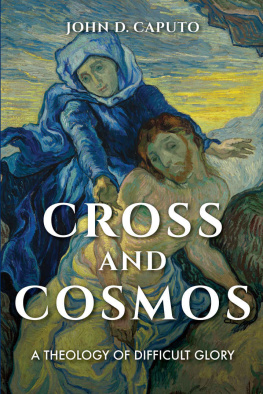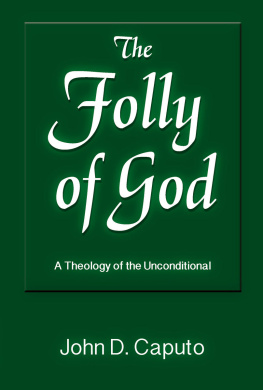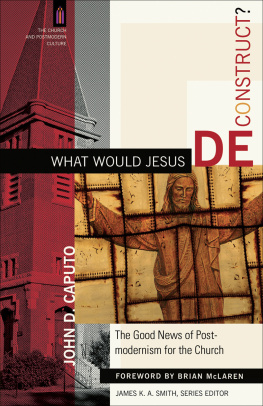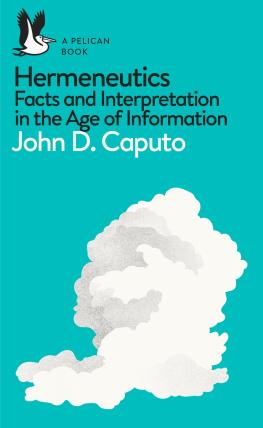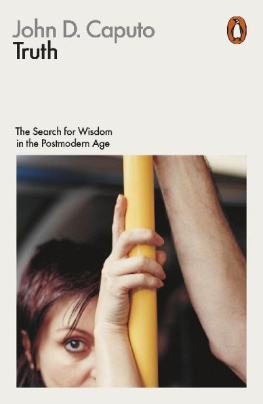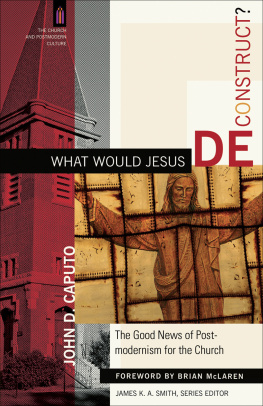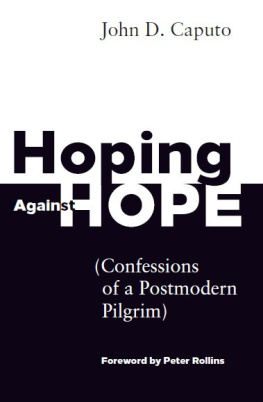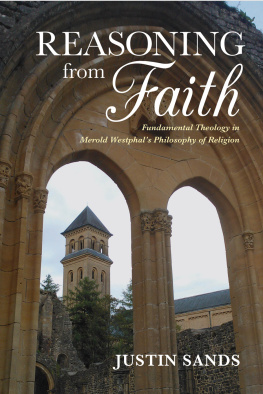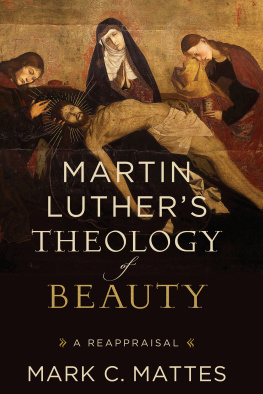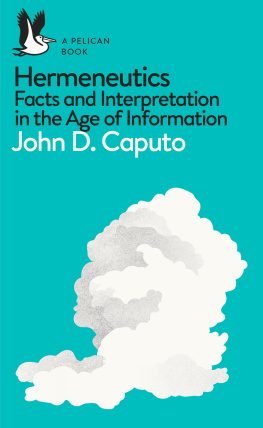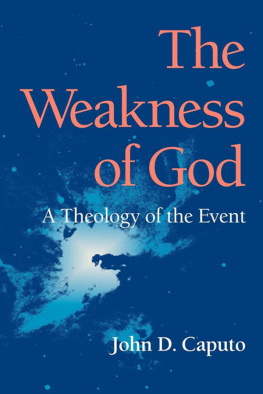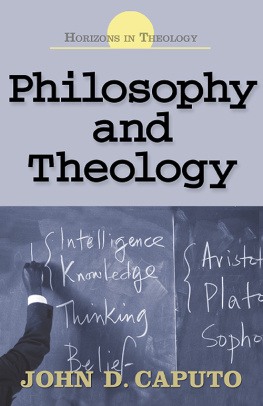CROSS AND COSMOS
INDIANA SERIES IN THE PHILOSOPHY OF RELIGION
Merold Westphal, Editor
CROSS AND
COSMOS
A Theology of Difficult Glory
John D. Caputo
INDIANA UNIVERSITY PRESS
This book is a publication of
Indiana University Press
Office of Scholarly Publishing
Herman B Wells Library 350
1320 East 10th Street
Bloomington, Indiana 47405 USA
iupress.indiana.edu
2019 by John D. Caputo
All rights reserved
No part of this book may be reproduced or utilized in any form or by any means, electronic or mechanical, including photocopying and recording, or by any information storage and retrieval system, without permission in writing from the publisher. The paper used in this publication meets the minimum requirements of the American National Standard for Information SciencesPermanence of Paper for Printed Library Materials, ANSI Z39.48-1992.
Manufactured in the United States of America
Cataloging information is available from the Library of Congress.
ISBN 978-0-253-04311-5 (cloth)
ISBN 978-0-253-04312-2 (paperback)
ISBN 978-0-253-04313-9 (ebook)
1 2 3 4 5 23 22 21 20 19
To Gavin and Claire,
for all the joy and laughter
CONTENTS
P ARTS OF THIS BOOKS HAVE APPEARED PREVIOUSLY.
: The Weakness of God: A Radical Theology of the Cross, in The Wisdom and Foolishness of God: First Corinthians 12 in Theological Exploration, ed. Christophe Chalamet and Hans-Christoph Askani (Minneapolis: Fortress Press, 2015), 2579.
: What Does Theology Promise? The Folly of the Cross and the Theology of Glory, in Whistling in the Dark: On the Theology of Craig Keen, ed. Janice McRandal and Stephen John Wright (Eugene, OR: Cascade Books, Wipf and Stock, forthcoming).
A section of : Theology, Poetry and Theopoetics, foreword to Luis Cruz-Villalobos, Poesia, Teologia (Santiago de Chile: Hebel, Ediciones Coleccin Arte-Sana, 2015); reprinted in The Art of Anatheism, ed. Richard Kearney and Matthew Clemente (London: Rowman Littlefield, 2018), 4348.
: God and Anonymity: Prolegomena to an Ankhoral Religion, in A Passion for the Impossible: John D. Caputo in Focus, ed. Mark Dooley (Albany: SUNY Press, 2003), 119.
.
My thanks to my two anonymous readers and to Merold Westphal, Series Editor, for many helpful suggestions for revising the original manuscript and to Dee Mortensen and the always wonderful staff at Indiana University Press.
F OR A LONG TIME, I RESISTED USING THE word theology. That came of a lifetime of overexposure to philosophers. For most of my career, I confined the word theology to church theology, the faith-based theology of the confessional theologians, or to the onto-theology of the metaphysical theologians. Until I did not. So, when Catherine Keller said on the back cover of The Weakness of God that I had come out of the closet as a theologian, I laughed, but as with everything Catherine Keller says, that is also to be taken seriously. It all began in Radical Hermeneutics, which is where I found my authorial voice, the person whom I am constantly impersonating in all my books, the person who I wish I were, the illusion I am trying to sustain. But the pivotal change took place in The Prayers and Tears of Jacques Derrida. This posed a stumbling block to the secular deconstructors by showing just how religious a thing a genuine deconstruction isto the approval of Derrida, who said this is how he loved to be readand it gave scandal to the theologians by showing just how deconstructive a thing a genuine theology is. Then, as Jeffrey Robbins argued, if there can be a radical hermeneutics, which is something of a signature notion for me, why not a radical theology?
After Prayers and Tears, which was about Derrida, there followed a trilogy of books about God (I dont confuse the two). In The Weakness of God, I argued (following 1 Cor 1) that theology must get over its love of power in favor of the powerless power of love, weakening the strong metaphysics of omnipotence into the soft power of the coming Kingdoms call. In The Insistence of God, I added a further plank to my platform. The name of God is not the name of a Supreme Being who does things or mysteriously leaves them undone but of what is getting done in and under this name. God does not exist; God insists. God does not subsist; God calls. Gods might is the might-be of a dangerous perhaps. In The Folly of God, I said that Gods folly is that, not thinking existence something to cling to, God emptied himself into the world (Phil 2:67), leaving existence to us, which is risky business, both for God and for us, since we may or may not follow through. In each case, God is an inexistent solicitation, to which we are to be the existential response. We are responsible for the existence of God. We are the ones God is waiting for to make the Kingdom come true, for God to be God. In the end, the real question is not Does God exist? but rather, as Katharine Sarah Moody puts it on my behalf, Will there have been God?
In the present work, I supplement the theology of the event and the theology of perhaps with a theology of difficult glory. This looks like something new for me, but in fact I am returning to a hitherto unacknowledged source of Radical Hermeneutics. Having been raised philosophically in the theologia gloriae (medieval Scholasticism), the theologia crucis was mediated to me early on through Kierkegaard, who had communicated it to the young Heidegger. There I found another project of radicalization, where radical did not mean the metaphysical foundationalism I had been nurtured on but radical exposure to an irreducible groundlessness. I am not posturing here. I am not trying to gain the confidence of the orthodox by associating myself with a classical text in order to look respectable. I am not trying to bask in its reflected glory, if I may say so. What follows is deadly serious, written with all the seriousness of death, which is never far. Although I am occasionally winsome in this book (not too much, I hopeI have gone over it several times with this in mind), I am as serious about this theologia crucis as Augustine when he said, I have become a terra difficultatis, been made a land of difficulty to myself (Conf. X, 16; see Gen 3:1719). I am as serious as Johannes Climacus sitting in Frederiksberg Garden, puffing a cigar, saying that he has finally discovered his lifes calling. Since everyone in the nineteenth century had succeeded in making things easierfrom telegraphs and omnibuses to Hegelian encyclopediasthe sole task remaining to him is to make things more difficult. The real difficulty in life, he offers, is the lack of difficulty.
This is an exquisite transcription, humorous and religious at the same time, of thesis 21 of the Heidelberg Disputation (1518): the theologians of glory call a good thing (difficulty) bad, and a bad thing (making things easy) good. Just so, the strategy of the pseudonyms, to use humor as an incognito of the religious, was a transcription of the logos of the cross Luther identified in Paul: when it comes to the cross, things appear under their contrary, sub contraria specie. The real glory in the theologia crucis is not the easy glory of the people smuggling themselves prematurely into the church triumphant, but the difficult glory of the church militant. When I introduced the idea of radical hermeneutics as the task of restoring life to its original difficulty, I was lifting a line from Heidegger, who pilfered it from Kierkegaard, who was paraphrasing Luther, who found it in Paul. The young Heidegger, however brilliantly he had absorbed the revolutionary force of the young Luther, could not on his longest day ever get the irony, the humornot Luthers, not Kierkegaards. That fell to a young rogue who was making waves in the last decade of Heideggers life under the slightly pseudonymous name of Jacques Derrida.
Next page
